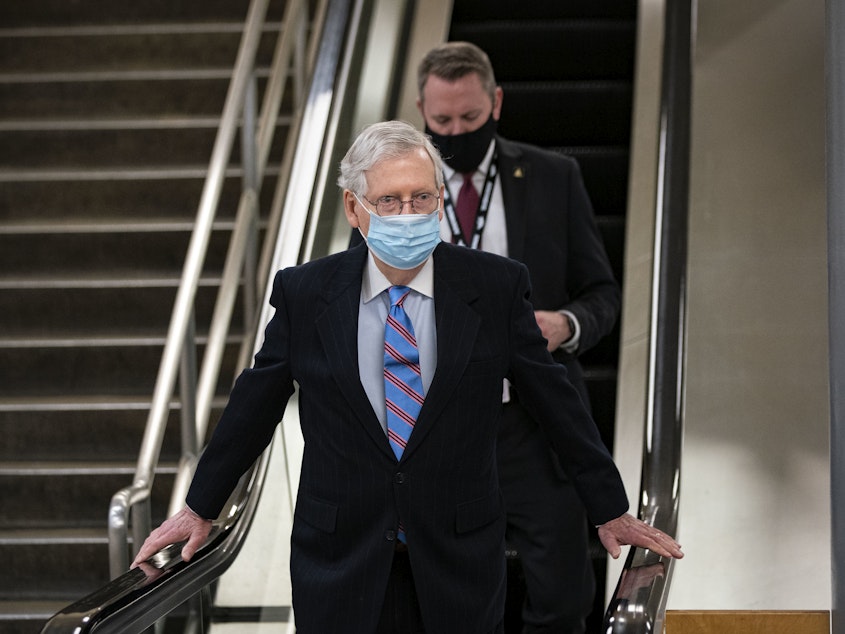McConnell Blasts Pelosi's Proposed Jan. 6 Commission As 'Partisan'

Senate Minority Leader Mitch McConnell slammed House Speaker Nancy Pelosi's draft proposal for a commission to investigate the Jan. 6 attack on the U.S. Capitol, calling it "partisan by design."
The Kentucky Republican said he agrees the siege on the Capitol warrants a "serious and thorough review," but said he thinks Pelosi's proposal falls short of the standard set by the commission established after the Sept. 11, 2001, terrorist attacks, upon which Pelosi said she would model this new panel.
"The 9/11 Commission was intentionally built to be bipartisan, 50-50 bipartisan split of the commissioners was a key feature," McConnell said Wednesday on the Senate floor. "It both helped the effectiveness of the investigation itself, and help give the whole country confidence in its work, and its recommendations."
His remarks appear to confirm news reports that Democratic leaders had proposed a panel that would have favored Democrats. A senior House Democratic aide said Pelosi's proposal was a "discussion draft, which was shared with the House Republican leadership one week ago and we requested edits."
The back and forth between the two sides underscores the challenges that any bipartisan panel will have in investigating the Jan. 6 attack. Not only are the two sides divided on who caused the attack, they are also split on what to investigate: Democrats reportedly want to include domestic violent extremism beyond the Jan. 6 attack. Republicans say if that happens, they will want to investigate left-wing violent groups.
McConnell said Wednesday added that in addition to equal party representation on the commission, there should be equal subpoena authority as well, a sentiment House Minority Leader Kevin McCarthy had also expressed earlier on Wednesday.
"Both the Democrat and Republican leaders of the 9/11 commission are speaking out against this bizarre partisan concept," McConnell said, referencing a recent Politico interview with the former commission leaders.
"That does not sound to me like a good start. It sounds like a partisan beginning," Lee Hamilton, the Democratic leader on the commission, told Politico.
House Majority Leader Steny Hoyer, D-Md., told reporters that he is not a part of the negotiations over the commission but said he thinks there has been a "deterioration in the ability of members to work together without partisan considerations."
"[Pelosi's] concern is, and I think it's a legitimate concern in many respects, is that the commission not be focused on defense of either President Trump or others, who may have been involved and who may have been perpetrators themselves," he said.
A commission would be one of many various steps lawmakers are taking to investigate the events that led to the breach of the Capitol.
On Tuesday, former top Capitol security officials testified before a joint Senate panel hearing that they didn't receive sufficient information from the intelligence community to adequately prepare for the expected demonstrations in Washington, D.C., on Jan. 6.
Sen. Amy Klobuchar, D-Minn., who chairs the Senate Rules Committee, announced there will be a second hearing next week with representatives from the FBI, Homeland Security and the Defense Department to "figure out what went wrong on their end in terms of giving the chiefs at the Capitol the information."
"We had always planned to focus first on the agencies that were directly in charge the day of the attack, hear what they had to tell us and then follow through with these other agencies," she told NPR's Noel King Wednesday.
Former U.S. Capitol Police Chief Steven Sund, who resigned in the aftermath of the insurrection, told Congress Tuesday the FBI sent a report warning of potential violence on Jan. 6 the night before the attack. He says he never received the warning.
"This is a report that I am just learning about within the last — they informed me yesterday of the report," he said Tuesday.
In that same hearing, acting Metropolitan Police Chief Robert Contee said his department received an email warning on Jan. 5 of possible violence the next day.
"I would certainly think that something as violent as an insurrection in the Capitol would warrant, you know, a phone call or something," Contee said. [Copyright 2021 NPR]



